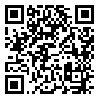Volume 6, Issue 1 (4-2013)
IJMEHM 2013, 6(1): 37-52 |
Back to browse issues page
Download citation:
BibTeX | RIS | EndNote | Medlars | ProCite | Reference Manager | RefWorks
Send citation to:



BibTeX | RIS | EndNote | Medlars | ProCite | Reference Manager | RefWorks
Send citation to:
Izadikhah A, Changiz, Yamani N, Mirshahjafarey I. Developing codes of ethics for clinical medicine educators. IJMEHM 2013; 6 (1) :37-52
URL: http://ijme.tums.ac.ir/article-1-5063-en.html
URL: http://ijme.tums.ac.ir/article-1-5063-en.html
1- , Isfahan University of Medical Sciences, Isfahan, Iran
2- Medical Education Research Center, Isfahan University of Medical Sciences, Isfahan, Iran
3- , Medical Education Research Center, Isfahan University of Medical Sciences, Isfahan, Iran
4- Education Sciences Department, University of Isfahan, Isfahan, Iran.
2- Medical Education Research Center, Isfahan University of Medical Sciences, Isfahan, Iran
3- , Medical Education Research Center, Isfahan University of Medical Sciences, Isfahan, Iran
4- Education Sciences Department, University of Isfahan, Isfahan, Iran.
Abstract: (10676 Views)
Documentation of accepted ethical behavior in special settings is one of the strategies employed to foster ethics in organizations. Such documents, known as codes of ethics, vary in different societies according to their cultural and ideological differences. Medical educators have dual professional roles (as physicians and teachers) that sometimes seem ethically incompatible. Therefore, having codes of ethics is essential in this profession. The aim of this study was to develop codes of ethics for clinical medicine educators with an Islamic-Iranian approach.
This was a three stage developmental research. First, a comprehensive literature review was conducted. Using content analysis method, the first draft of a code of ethics for clinical medicine educators was prepared. Second, the draft was thoroughly and critically reviewed and revised in experts’ focus group discussion and the 2nd draft was devised. This was further reviewed by a group of 24 experts at the national level (validated) and revised according to their comments, and thus the 3rd draft was prepared to be presented for formal approval process.
The final document includes 55 codes of ethics in 18 topics (conscientiousness, accountability, respectfulness, scientific excellence, respect for others’ freedom, equity, patience, religious commitment, modesty, trustworthiness, humility, contentment, relationship with coworkers, attentiveness toward patients, attentiveness toward learners, kindness, confidentiality, and discipline).
It seems that extracting ethical concepts from the rich Islamic-Iranian cultural resources is feasible, and provides an appropriate basis for the development of ethical codes for medical educators. Compared to Western codes, such codes may be better accepted in Iranian contexts and will be implemented more readily if the organizational settings are prepared simultaneously.
Type of Study: Research |
Subject:
Medical Ethics
Received: 2013/06/18 | Accepted: 2013/07/6 | Published: 2013/07/6
Received: 2013/06/18 | Accepted: 2013/07/6 | Published: 2013/07/6
Send email to the article author
| Rights and permissions | |
 |
This work is licensed under a Creative Commons Attribution-NonCommercial 4.0 International License. |





